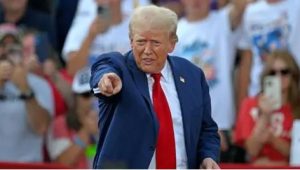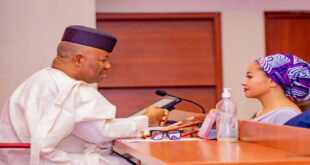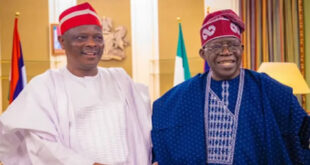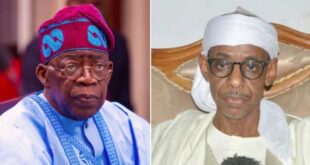Although Donald Trump isn’t physically in Chicago, his influence is palpable, and he’s evidently keeping an eye on the events there. Before Kamala Harris’s speech on Thursday, a few of Trump’s aides claimed, somewhat unconvincingly, that the former president wasn’t paying attention to the Democratic National Convention, dismissing it as a Democratic Party “infomercial.” However, one senior campaign official, speaking anonymously, confirmed that Trump is indeed watching and is frustrated by the criticism directed at him.

According to one ally who speaks with Trump regularly, the key to his success in the November election is staying focused on issues like the economy, the border, and crime. Earlier this week, it seemed possible that Trump might stick to this strategy. He planned a series of rallies in Pennsylvania, Michigan, North Carolina, and Arizona, each centered around these political and economic issues.

However, with relentless anti-Trump rhetoric in Chicago, staying on message has become a challenge. Furthermore, his supporters don’t seem to want him to stick solely to policy discussions. At his rally in North Carolina on Wednesday, Trump reverted to his typical style, turning the event into a referendum on his team’s strategy. “They always say, ‘Sir, please stick to policy, don’t get personal’… and yet [the Democrats are] getting personal all night long, these people. Do I still have to stick to policy?” Trump asked the crowd. When he polled them, they overwhelmingly supported him going personal rather than sticking to policy. He jokingly said, “My advisers are fired!” but added that while he’d try to focus on policy, he couldn’t ignore the attacks.

This approach has left his campaign strategy seemingly at the mercy of his whims and crowd feedback. This unpredictability makes it difficult for his campaign advisers, who admit their biggest concern is whether they can keep Trump focused on the issues rather than engaging in controversial personal attacks.
There have already been a few of these incidents this week. Late Wednesday night, Trump took to social media to criticize Democratic Pennsylvania Governor Josh Shapiro, who had delivered a strong speech earlier in the evening. Trump, unhappy with what he heard, wrote, “The highly overrated Jewish Governor of the Great Commonwealth of Pennsylvania, Josh Shapiro, made a really bad and poorly delivered speech. I have done more for Israel than any President…Shapiro has done nothing for Israel, and never will.”
Trump’s emphasis on Shapiro’s Jewish identity did not go unnoticed and was highlighted by the US morning shows as an example of a racial dog whistle. Similarly, after the Obamas criticized Trump at the DNC on Tuesday night, he responded during his rally in North Carolina, again with a hint of racial undertone. “Did you see Barack Hussein Obama last night?” Trump asked. “He was taking shots at your president. And so was Michelle.” Although the Obamas did make personal attacks on Trump, using Obama’s middle name, “Hussein,” is a tactic often employed to stir racial animosity.

The challenge for Trump’s team is that their candidate thrives on controversy, which then dominates the headlines, distracting from their efforts to highlight weaknesses in his opponents’ policies. “It doesn’t matter what he talks about for 45 minutes,” one adviser admitted anonymously. “One comment or answer to a question gives the left all they need to change the subject.”
 Gistfox Your News Window To The World
Gistfox Your News Window To The World 




